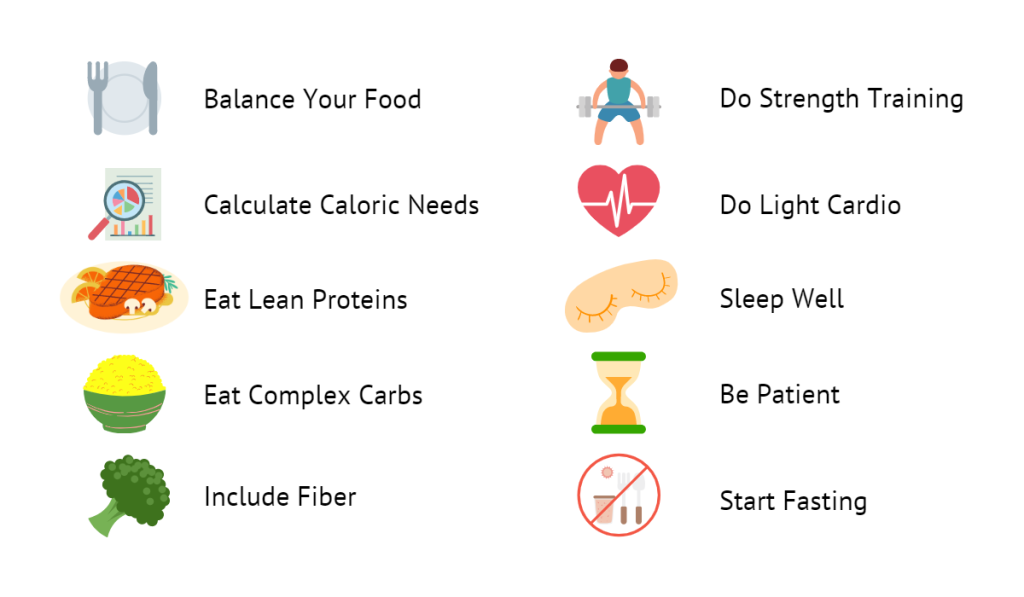Everyone wants to be at their best. Despite the fact that our bodies have different aspects, they are all very well connected. Improving your body’s fitness will affect your overall health, like mental state and disease prevention. My life dramatically became better as I lost a lot of weight and started to eat healthily. I got rid of depression, became more active in my daily job, and felt overall good about myself. Join me today as I go over the definition of body fitness and how you can start a new journey toward a healthier lifestyle. Let’s dive right in.
Table of Contents
What is Body Fitness?
Body fitness (or physical fitness) is described as a state in which we can look, feel, and do our best. Reaching peak physical fitness unlocks our maximum potential and enhances our physical and health attributes.
With that being said, it is difficult to measure fitness. It is the sum of many physical and health attributes like speed, strength, endurance, and flexibility. However, you can measure your body goals by deciding how much muscle you should build and how much weight you should lose. If you want to know how to set your body goals, check out my other article here.
The importance of physical fitness stretches beyond the aspects of physical performance. With that being the primary benefit, other benefits are as follows:
- Prevention of disease. Chronic diseases like cardiopulmonary disorders and diabetes type 2 are totally preventable and/or curable by improving body fitness. And these are just the main ones. The list includes some gastrointestinal disorders, sexual disorders, varicose veins, and much much more.
- Improve Mental Health. Have you ever heard the phrase “a healthy body is a healthy mind”? Improving physical fitness can lead to better energy levels, less anxiety, stress, and depression with a feeling of satisfaction.
- Better Daily Function. You will be more active in your daily life and get things done better and faster. Your energy levels will increase despite the fact that you’re putting effort into your workouts.
That’s just an overall summary of what being fit can do to you. You can literally increase your longevity by years just by being physically active. Now let’s move on to what can you do to start your life-changing journey.
How to start improving your body fitness
Here are the core fundamentals to start taking care of your physical well-being. They’re not that hard to do and can be easily incorporated into your lifestyle.

1. Include protein, veggies, and carbs in your meal.
Half of your plate should contain vegetables and fruits, while protein and carbs should be a quarter each. Use oils in moderation and avoid fatty meals like deep-fried foods. Use your imagination, a plate is just a metaphor. An egg sandwich with tomato and lettuce ticks the boxes mentioned above, or consume most of your carbs in breakfast and Lunch and go heavy on protein in dinner. It’s up to you how to structure your meals depending on your daily routines and your personal preferences, as long as you stick to the main rule.
2. Know your daily nutritional needs.
Every one of us is unique. Our daily energy needs vary depending on our length, stature, sex, and physical activity. Your overall calories and macronutrients are the most important factor in your body fitness. If you can understand the overall picture here, then you’re off to a good start. There are several online calculators that can make the job easier for you, just search for them online and you’ll find some. This is the first step to being caloric aware, and it can make you start to distinguish what’s good and what’s bad for you.
3. Eat Whole Grains.
They contain starches (complex carbs) that release energy throughout the day, unlike sugars that give you a short burst and crash shortly afterward just to make you feel miserable. Complex carbs are high on a scale called the glycemic index, while sugars are on the other side of that scale. Always aim for carbs that are high on the glycemic index. However, I am not the person that will tell you to quit sugar. I have a sweet tooth myself, and I found them quite useful when I break a fast or after a workout. In addition, they give a sight of mental relief. Just consume it in moderation. Examples are quinoa, oats, brown rice, and the products that are made of it like whole wheat pasta.
4. Include Fiber in your diet.
This is a follow-up to the previous point, but important enough to be a point on its own. Eating complex carbs as we mentioned will provide you with some fiber and will steer you clear of sugar. However, it is understandable that you won’t eat complex carbs all the time and you might just not get enough fiber. This is when fiber-rich foods come into play. My favorite fiber-rich foods are legumes, with lentil soup being my go-to easy option most of the time. Fiber is very important in making you feel full and regulating your bowel movements. Too much fiber can cause diarrhea while too little can cause constipation.
5. Eat Lean Proteins.
As mentioned, protein should constitute 25% of your dish. However, many types of meat can contain a lot of fat. They’re fine if they’re consumed in moderation, but the protein-to-fat ratio won’t be optimal. By adding lean meats to your diet you can improve that ratio and get more protein by consuming fatty meals. This can be applied to vegetarian sources of protein too, but this time it is a different story. Good sources of protein in plant sources can contain a lot of carbs, and you’re suddenly consuming a lot of carbs that will be stored as fat. The only solution is to look for and consume lean proteins like chicken breast.
6. Start Fasting.
You don’t need to worry about fasting for an extended period of time, like going over ten hours without food. Just start fasting for a few hours daily, and slowly increase the length of that time. Ideally, you should be fasting between meals, and if you wake up at night, you should avoid going to the fridge and start to look around for things to eat. Fasting increases your willpower to abstain from unnecessary eating, and long periods of fasting can stop you from eating excessively. You can still have water and zero-calorie drinks like coffee and tea. Check out my article about how to do 18:6 intermittent fasting here.
7. Do light cardio body fitness training.
Ditch the car, take long walks, or use a bicycle. Run small errands like shopping on foot and get some fresh air. That is both health and time efficient, instead of separating workouts from daily life. It is also beneficial to the environment as you decrease your carbon footprint. I sometimes take long walks just to have fun and change my mood. You can also do high-intensity interval training (HIIT) but the downside it requires a lot of energy, and sometimes in our busy daily lives we just don’t have it. You also can’t do much of it, because it can lead to injury. I would suggest 40 minutes maximum per week, but you can do more than that. It would only burn 500 kcal. I take a 2 hours walk daily and it burns about the same amount without any detrimental effect on my energy level, health, and well-being.
8. Do full-body strength fitness training.
Strength training builds muscle, and in turn, increases basal metabolic rate. This will allow you to burn more calories at rest and stay healthy. Improved strength can also help you in managing daily tasks with a breeze. You can start simply at home doing bodyweight training, and start gradually going to the gym. In my opinion, the gym is more effective than working out at home. This is because you can control weight and achieve progress. It also saves time by doing less repetition with higher weights. The most important thing to do when you start strength training is to do a full-body workout. I work out 3 days a week, assigning each of my main muscle groups to a certain day (chest & shoulders, back & abs, legs). Remember to leave your ego outside the gym, start low, and go slow.
9. Get good sleep.
Being fit improves your sleep, and sleeping well improves your fitness. These two things are very well interconnected. Sleeping is the time when your body repairs itself. it builds muscle, regulates water, and repairs your brain. Sleep deprivation can cause less performance in fitness training and as a result, you won’t reach your goals quickly. Lack of sleep can also affect your concentration, which might lead to injury during a workout. Science does not know much about sleep yet, and many researchers are exploring the field. One thing is certain, it plays an important part in our body fitness.
10. Approach your body fitness with patience and consistency.
There’s no “magic bullet” when it comes to our health, and despite what that flashy fitness course ad told you it is going to take time. Be patient, disciplined, and consistent. Celebrate small wins, these are important milestones in your journey. Even if you get in shape, it will still require some of that discipline to stay in shape. Think of this as a whole lifestyle, and one for the better. Forget about the scale, it can be confusing sometimes. You will feel a change in your clothes, sleep, and the way people perceive you. Don’t think about it too much, in time you will reap the benefits.
Conclusion
So there you have it, that’s how you can start today improving yourself and optimizing your body fitness. Which of the things I mentioned do you need to start working on? Let me know in the comments, and share this article with someone who wants to start their fitness journey toward a better lifestyle.


